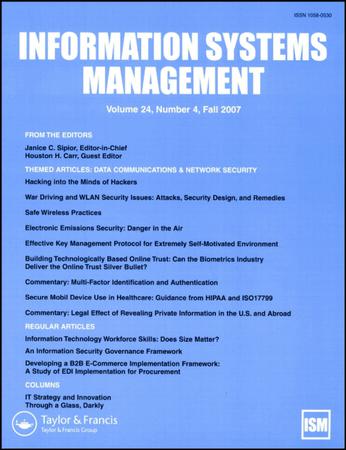理解电子政务服务使用的持续性:服务质量和服务习惯的作用
IF 3.9
3区 管理学
Q2 COMPUTER SCIENCE, INFORMATION SYSTEMS
引用次数: 0
摘要
摘要本研究考察了公民在采用电子政务服务后的继续使用意愿。我们透过“电子政府一站通”模式整合服务质素和习惯,发展资讯系统验收后的持续扩展模式。实证结果表明,服务质量的纳入效果优于原模型,习惯通过调节和中介作用直接和间接地影响公民对电子政务服务的继续使用意愿。本研究得到了希腊雅典经济与商业大学商业信息学实验室(BILab)和会计研究、财务管理、经济与金融法跨学科实验室的支持。披露声明作者未报告潜在的利益冲突。本文作者xenia J. Mamakou是雅典经济与商业大学工商管理系的博士后研究员和商业信息实验室(BILab)的成员。她拥有信息系统博士学位,主要研究领域为电子商务、电子政务、服务质量和商业分析。Sandra Cohen是希腊雅典经济与商业大学工商管理系会计学教授。主要研究方向为公共部门会计和管理会计。她是处理公共部门财务管理的几个研究小组的成员。本文章由计算机程序翻译,如有差异,请以英文原文为准。
Understanding E-Government Services Usage Continuance: The Role of Service Quality and Habit
ABSTRACTIn this study, we examine the citizens’ continuance intention to use e-government services after adoption. We develop a post-acceptance Information Systems continuance extended model by integrating service quality through the e-GovQual model, and habit. Our results provide corroborative evidence that the inclusion of service quality gives better results than the original model and habit has a strong influence on citizens’ continuance intention regarding e-government services usage both directly and indirectly through moderating and mediating effects.KEYWORDS: IS continuance intentionservice qualityhabite-governmente-GovQualpost-acceptance model AcknowledgementsThis research was supported by the facilities available at the Business Informatics Laboratory (BILab) and the Interdisciplinary Laboratory in Accounting Studies, Financial Management, and Economic and Financial Law, both at the Athens University of Economics & Business, Greece.Disclosure statementNo potential conflict of interest was reported by the author(s).Additional informationNotes on contributorsXenia J. MamakouXenia J. Mamakou is a postdoctoral researcher and a member of the Business Informatics Laboratory (BILab) in the Department of Business Administration at the Athens University of Economics and Business. She holds a PhD in Information Systems and her main research interests are in the areas of e-commerce, e-government, service quality, and business analytics.Sandra CohenSandra Cohen is a Professor of Accounting in the Department of Business Administration at the Athens University of Economics and Business, Greece. Her research interests lie in public sector accounting and management accounting. She is a member of several research groups dealing with public-sector financial management.
求助全文
通过发布文献求助,成功后即可免费获取论文全文。
去求助
来源期刊

Information Systems Management
工程技术-计算机:信息系统
CiteScore
14.60
自引率
1.60%
发文量
20
审稿时长
>12 weeks
期刊介绍:
Information Systems Management (ISM) is the on-going exchange of academic research, best practices, and insights based on managerial experience. The journal’s goal is to advance the practice of information systems management through this exchange.
To meet this goal, ISM features themed papers examining a particular topic. In addition to themed papers, the journal regularly publishes on the following topics in IS management.
Achieving Strategic IT Alignment and Capabilities
IT Governance
CIO and IT Leadership Roles
IT Sourcing
Planning and Managing an Enterprise Infrastructure
IT Security
Selecting and Delivering Application Solutions
Portfolio Management
Managing Complex IT Projects
E-Business Technologies
Supporting Knowledge Work
The target readership includes both academics and practitioners. Hence, submissions integrating research and practice, and providing implications for both, are encouraged.
 求助内容:
求助内容: 应助结果提醒方式:
应助结果提醒方式:


